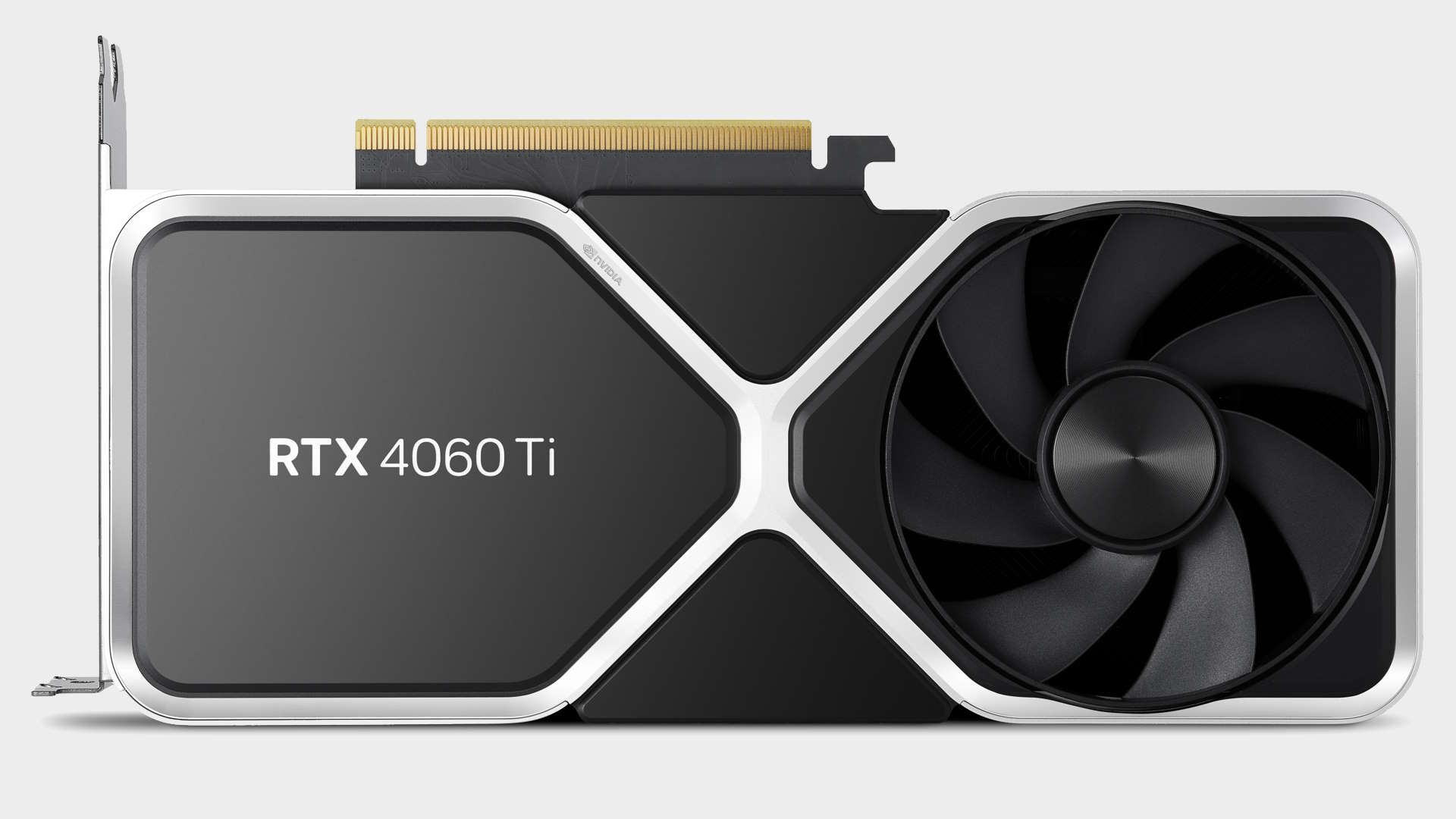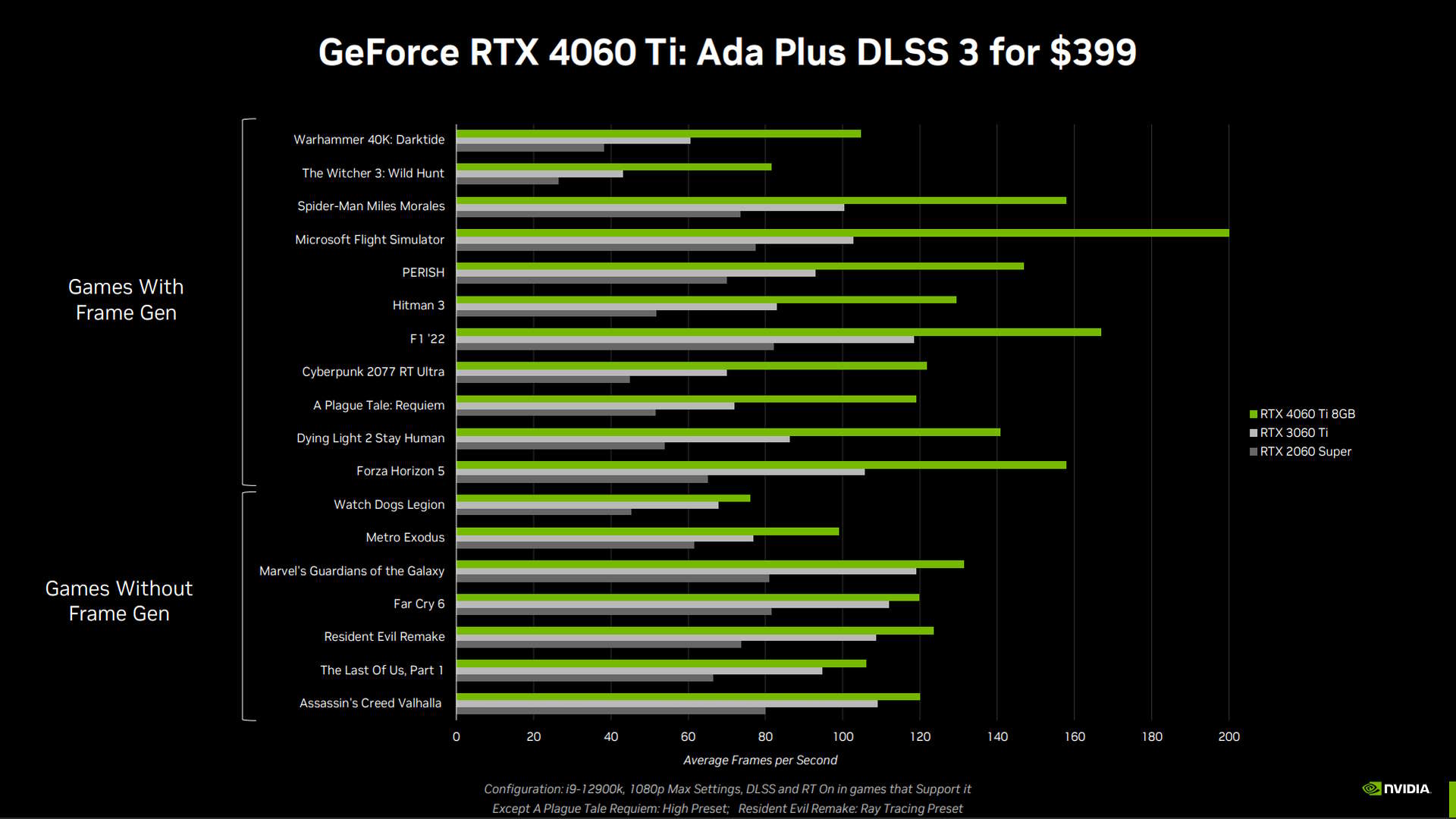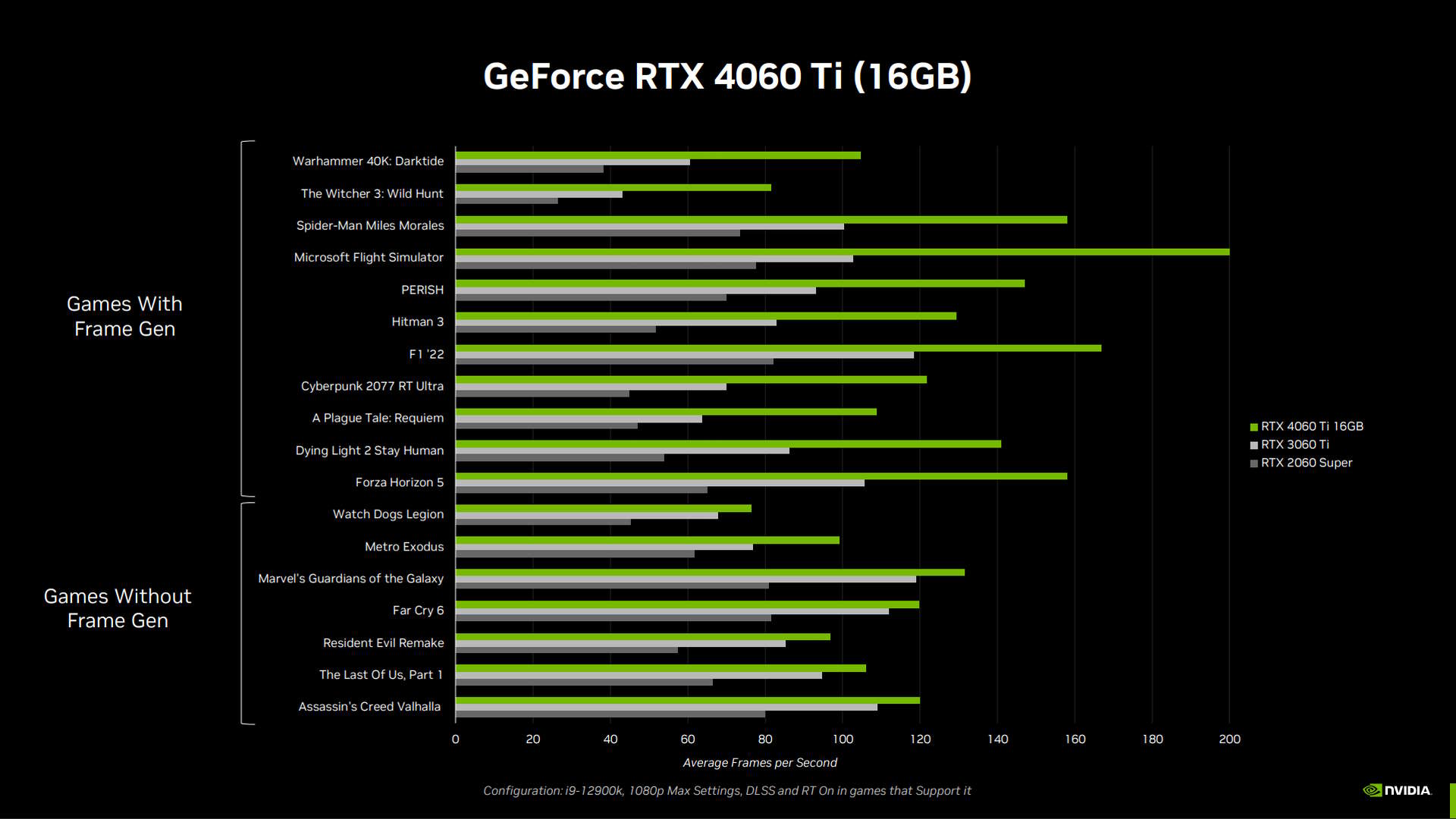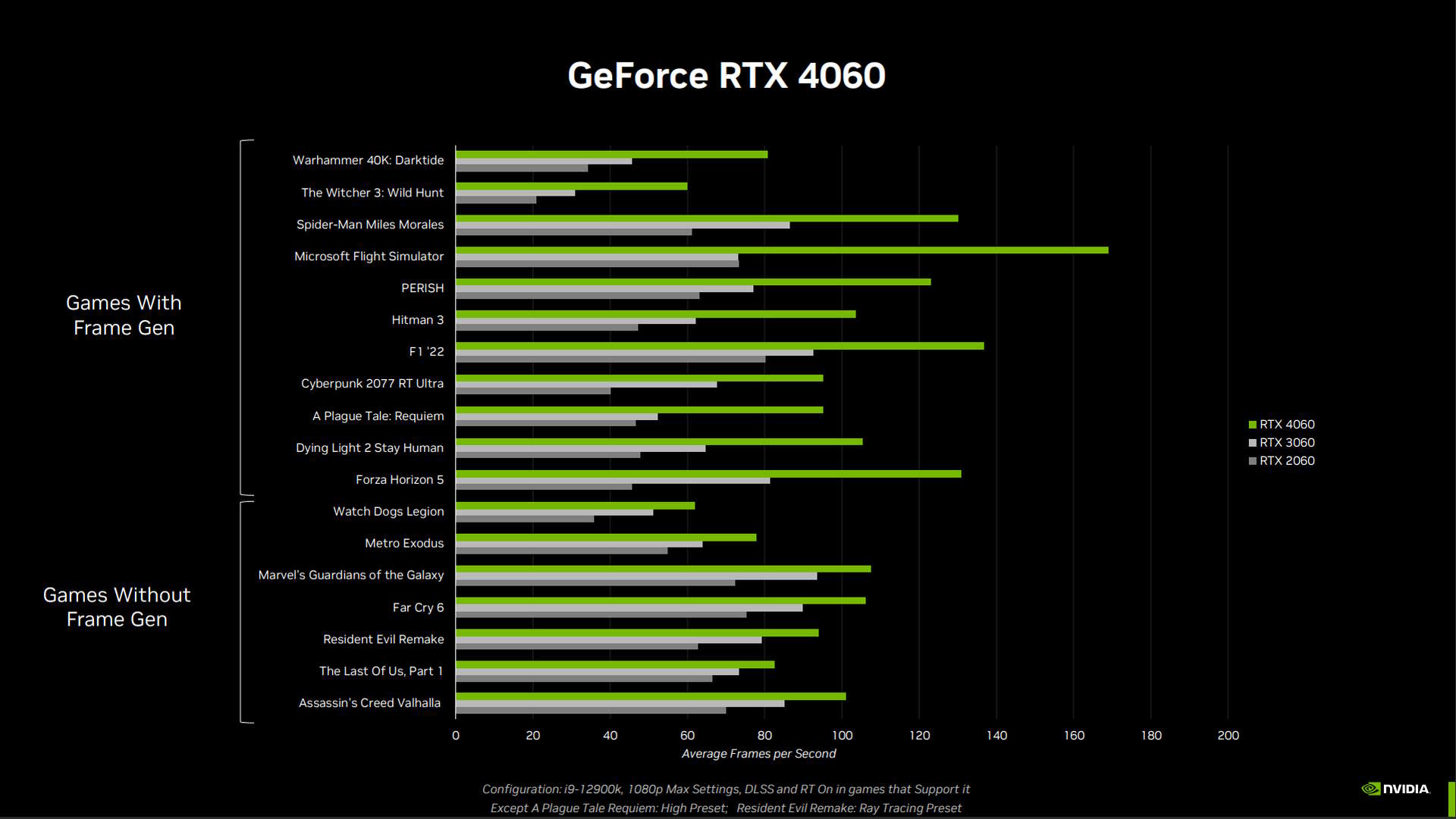Nvidia's $299 RTX 4060 means we're finally getting a next-gen GPU that costs less than the graphics card it's replacing
The Nvidia RTX 4060 Ti is coming May 24 for $399, with a $299 RTX 4060 following in July. And yes, there really is going to be a 16GB RTX 4060 Ti at $499, too. For... reasons.

You already know most of this, to be fair, but it's all official now: the RTX 4060 Ti is going to be on shelf on May 24 with a retail price of $399. Yes, it's taken five iterations of the new Ada architecture to finally get down to a new GPU priced at the same level as the graphics card it's replacing.
And then the sixth tier card, the RTX 4060, is going to be on sale for less than the RTX 3060 launched at. Ah, graphics cards in 2023. They're a treasure, aren't they?
The RTX 3060 Ti launched at the same $399 sticker price back in 2020, and next week will see the launch of the RTX 4060 Ti with roughly 17% higher gaming performance. That's the straight raster performance boost the Ada architecture is delivering in this new generation of mid-range GPU, though there is the extra speed bump you get from the Ada-only magic of Frame Generation.
In games that support it you're then looking at a 70% performance boost and that's a lot more tantalising an upgrade than it might otherwise look. Though it's worth stating that, while more and more games are getting Frame Generation added to them, it's still not implemented in a particularly broad swathe of PC games.
But, as well as being faster, the AD106 GPU is bringing TSMC's 4nm efficiency into a more affordable design. At 160W the RTX 4060 Ti has a lower TGP than either the RTX 3060 Ti or the RTX 2060 Super that preceded it. And that's the same whether we're talking about the standard 8GB or the 16GB version.
Ah yes, the RTX 4060 Ti 16GB card is real, is coming soon, and is more expensive. Nvidia has confirmed that it's going to launch the 16GB card in July for $499, basically for all those people whining about the fact the RTX 4060 Ti is only launching with 8GB of GDDR6.
| Header Cell - Column 0 | GPU | Processing power | Frame buffer | Cache | Memory bandwidth | TGP | Price |
|---|---|---|---|---|---|---|---|
| Nvidia RTX 4060 Ti | AD106 | 22 TFLOPs | 8GB | 16GB | 32MB L2 | 288 GB/s | 160W | $399 | $499 |
| Nvidia RTX 3060 Ti | GA104 | 16 TFLOPs | 8GB | 4MB L2 | 448 GB/s | 200W | $399 |
| Nvidia RTX 4060 | AD107 | 15 TFLOPs | 8GB | 24MB L2 | 272 GB/s | 115W | $299 |
| Nvidia RTX 3060 | GA106 | 13 TFLOPs | 12GB | 3MB L2 | 360 GB/s | 170W | $329 |
And no, the 16GB card doesn't have any tangible performance benefits over the 8GB version. At least not according to Nvidia's own performance benchmarks, where it was at pains to point out to me that even in a game that's been recently highlighted as proof that 8GB isn't going to be enough for 1080p gaming going forward, it makes no difference.
Keep up to date with the most important stories and the best deals, as picked by the PC Gamer team.
In Nvidia's testing of The Last of Us, with its latest PC patch, the RTX 4060 Ti 8GB performs at exactly the same level as the card with 16GB. It must be said, however, that all of Nvidia's benchmarks are at 1080p, so there could be some performance difference at the higher 1440p resolution where you'd expect the RTX 4060 Ti to still be pretty capable.



Still, why should you pay another $100 for the RTX 4060 Ti 16GB? That, right now, I can't tell you. The extra $100 is, apparently, about the extra cost of the PCB, and if you're the sort who really cares about the 8GB vs. 16GB 1080p debate then maybe you're the sort who will pay more.
Ah, I dunno really. Suffice to say that if Nvidia had priced the 16GB card any lower—say at $449—then no-one would buy the earlier 8GB version and would just wait for the 16GB to arrive. To me, it smacks of a cynical reaction to the online vitriol over what is seen as a miserly amount of VRAM on a $400 GPU, especially in the face of a slew of terrible PC ports with a voracious appetite for video memory.
July will see the release of another new Ada graphics card, and a new GPU, too. The AD107 GPU will make its desktop debut in the RTX 4060 for $299. It's a significantly lower spec GPU, likely with fewer CUDA cores than its predecessor if its matching the mobile RTX 4060 as expected. I guess the good news is that this is going to be the first Ada graphics card to launch for below the price of the GPU it's replacing.
So yes, we're kinda getting there. Slowly.
Nvidia's own numbers place it at 20% faster than the RTX 3060 of the Ampere generation in standard rasterised gaming, with the same 70% uplift as the Ti card when you factor in the games with Frame Generation support.
We'll have our own independent benchmarks of both cards when the relevant review embargos lift. And with the RTX 4060 Ti launching next week you won't have long to wait for the full lowdown on the new Ada GPUs.

Dave has been gaming since the days of Zaxxon and Lady Bug on the Colecovision, and code books for the Commodore Vic 20 (Death Race 2000!). He built his first gaming PC at the tender age of 16, and finally finished bug-fixing the Cyrix-based system around a year later. When he dropped it out of the window. He first started writing for Official PlayStation Magazine and Xbox World many decades ago, then moved onto PC Format full-time, then PC Gamer, TechRadar, and T3 among others. Now he's back, writing about the nightmarish graphics card market, CPUs with more cores than sense, gaming laptops hotter than the sun, and SSDs more capacious than a Cybertruck.

